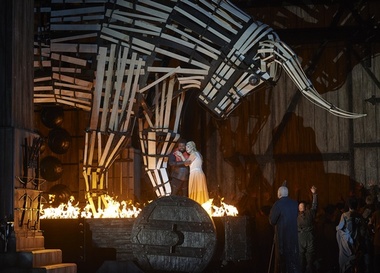 The COC's Norma. Photo: Michael Cooper.
The COC's Norma. Photo: Michael Cooper. However, “ambivalent” and “conflicted” are exactly the right words to describe my own reaction to the Canadian Opera Company’s Norma, which I saw on Tuesday night.
Yet any production of Norma is going to be judged, first and foremost, on the soprano in the title role. And with Sondra Radvanovsky cast as the ill-fated Druid priestess, the COC’s production had some solid star-power behind it. The New York Times has called Radvanovsky “radiant,” praising her “dynamic control and expressive nuance.” And the Washington Post declared her voice “outright gorgeous.”
They’re right – she’s all of these things, and more besides. We humble Canucks are fortunate to have her on our shores (she lives just an hour’s drive northwest of Toronto) and singing at the COC.
She was in fine form on Tuesday, filling the Four Seasons Centre with blooming phrases and tonal beauty. Her vocal range and stamina, and her dramatic ownership of her role, were astonishing – and her “Casta Diva” alone was worth the price of admission. But for all that, I remain unconvinced that a role like Norma is ideal for her: her voice is simply too big, weighty and powerful to make bel canto her strong suit. And I’m well aware that, in saying this, I am disagreeing with numerous critics (see here, here and here) – and with Radvanovsky herself, who has sung leading roles in Maria Stuarda, Anna Bolena, Roberto Devereux and other bel canto operas.
Radvanovsky’s miscast-ness was underscored by the presence of mezzo Isabel Leonard as Adalgisa, whose vocal sweetness, lightness and flexibility were made for bel canto. When singing with Leonard in Act I, Radvanovsky intelligently matched her voice – yet it sounded like she was making a special, restrained, effort to do so. And compared with Leonard, Radvanovsky’s runs and ornaments sounded masterful but recherché.
But at the beginning of Act II, the thought of killing her own children sent Radvanovsky into howls of verismo horror. And when she sang with tenor Russell Thomas – whose forceful (and sometimes forced) tenor sounded more like Calaf than Pollione – her Norma started to sound like Princess Turandot. Also, as Thomas is no great actor, there wasn’t a lot of chemistry between him and Radvanovsky (or between him and anyone else on stage).
I would love to hear Radvanovsky sing more Verdi and Puccini. And I take no pleasure in expressing dissatisfaction with a singer of her abilities and accomplishments. But, as I’ve already said, honesty is a harsh taskmaster.
© Colin Eatock 2016
 RSS Feed
RSS Feed

